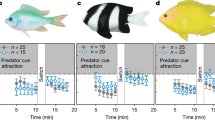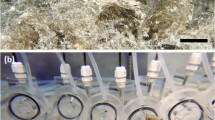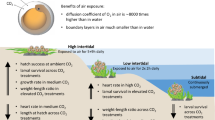Abstract
Behaviour and sensory performance of marine fishes are impaired at CO2 levels projected to occur in the ocean in the next 50–100 years1,2,3,4,5, and there is limited potential for within-generation acclimation to elevated CO2 (refs 6, 7). However, whether fish behaviour can acclimate or adapt to elevated CO2 over multiple generations remains unanswered. We tested for transgenerational acclimation of reef fish olfactory preferences and behavioural lateralization at moderate (656 μatm) and high (912 μatm) end-of-century CO2 projections. Juvenile spiny damselfish, Acanthochromis polyacanthus, from control parents (446 μatm) exhibited an innate avoidance to chemical alarm cue (CAC) when reared in control conditions. In contrast, juveniles lost their innate avoidance of CAC and even became strongly attracted to CAC when reared at elevated CO2 levels. Juveniles from parents maintained at mid-CO2 and high-CO2 levels also lost their innate avoidance of CAC when reared in elevated CO2, demonstrating no capacity for transgenerational acclimation of olfactory responses. Behavioural lateralization was also disrupted for juveniles reared under elevated CO2, regardless of parental conditioning. Our results show minimal potential for transgenerational acclimation in this fish, suggesting that genetic adaptation will be necessary to overcome the effects of ocean acidification on behaviour.
This is a preview of subscription content, access via your institution
Access options
Subscribe to this journal
Receive 12 print issues and online access
$209.00 per year
only $17.42 per issue
Buy this article
- Purchase on Springer Link
- Instant access to full article PDF
Prices may be subject to local taxes which are calculated during checkout


Similar content being viewed by others
References
Munday, P. L. et al. Ocean acidification impairs olfactory discrimination and homing ability of a marine fish. Proc. Natl Acad. Sci. USA 106, 1948–1852 (2009).
Munday, P. L. et al. Replenishment of fish populations is threatened by ocean acidification. Proc. Natl Acad. Sci. USA 107, 12930–12934 (2010).
Briffa, M., de la Haye, K. & Munday, P. L. High CO2 and marine animal behaviour: Potential mechanisms and ecological consequences. Mar. Pollut. Bull. 64, 1519–1528 (2012).
Jutfelt, F., Bresolin de Souza, K., Vuylsteke, A. & Sturve, J. Behavioural disturbances in a temperate fish exposed to sustained high-CO2 levels. PLoS ONE 8, e65825 (2013).
Hamilton, T. J., Holcombe, A. & Tresguerres, M. CO2-induced ocean acidification increases anxiety in rockfish via alteration of GABAA receptor functioning. Proc. R. Soc. B 281, 20132509 (2014).
Munday, P. L., Cheal, A. J., Dixson, D. L., Rummer, J. L. & Fabricius, K. E. Behavioural impairment in reef fishes caused by ocean acidification at CO2 seeps. Nature Clim. Change 4, 487–492 (2014).
Munday, P. L. et al. Elevated CO2 affects the behavior of an ecologically and economically important coral reef fish. Mar. Biol. 160, 2137–2144 (2013).
Branch, T. A., DeJoseph, B. M., Ray, L. J. & Wagner, C. A. Impacts of ocean acidification on marine seafood. Trends Ecol. Evol. 28, 178–186 (2013).
Leduc, A. O. H. C., Munday, P. L., Brown, G. E. & Ferrari, M. C. O. Effects of acidification on olfactory-mediated behaviour in freshwater and marine ecosystems: A synthesis. Phil. Trans. R. Soc. B 368, 20120447 (2013).
Chung, W. S., Marshall, N. J., Watson, S. A., Munday, P. L. & Nilsson, G. E. Ocean acidification slows retinal function in a damselfish through interference with GABAA receptors. J. Exp. Biol. 217, 323–326 (2014).
Ferrari, M. C. O. et al. Putting prey and predator into the CO2 equation — Qualitative and quantitative effects of ocean acidification on predator–prey interactions. Ecol. Lett. 14, 1143–1148 (2011).
McCormick, M. I., Watson, S-A. & Munday, P. L. Ocean acidification reverses competition for space as habitats degrade. Sci. Rep. 3, 3280 (2013).
Dixson, D. L., Munday, P. L. & Jones, G. P. Ocean acidification disrupts the innate ability of fish to detect predator olfactory cues. Ecol. Lett. 13, 68–75 (2010).
Domenici, P., Allan, B., McCormick, M. I. & Munday, P. L. Elevated carbon dioxide affects lateralization in a coral reef fish. Biol. Lett. 8, 78–81 (2012).
Chivers, D. P. et al. Impaired learning of predators and lower prey survival under elevated CO2: A consequence of neurotransmitter interference. Glob. Change Biol. 20, 515–522 (2014).
Nilsson, G. E. et al. Near-future carbon dioxide levels alter fish behaviour by interfering with neurotransmitter function. Nature Clim. Change 2, 201–204 (2012).
Sunday, J. M. et al. Evolution in an acidifying ocean. Trends Ecol. Evol. 29, 117–125 (2014).
Almany, G. R. & Webster, M. S. The predation gauntlet: Early post-settlement mortality in reef fishes. Coral Reefs 25, 19–22 (2006).
Miller, G. M., Watson, S-A., Donelson, J. M., McCormick, M. I. & Munday, P. L. Parental environment mediates impacts of increased carbon dioxide on a coral reef fish. Nature Clim. Change 2, 858–861 (2012).
Parker, L. M. et al. Adult exposure influences offspring response to ocean acidification in oysters. Glob. Change Biol. 18, 82–92 (2012).
Murray, C. S., Malvezzi, A., Gobler, C. J. & Baumann, H. Offspring sensitivity to ocean acidification changes seasonally in a coastal marine fish. Mar. Ecol. Prog. Ser. 504, 1–11 (2014).
Allan, B. J. M., Miller, G. M., McCormick, M. I., Domenici, P. & Munday, P. L. Parental effects improve escape performance of juvenile reef fish in a high-CO2 world. Proc. R. Soc. B 281, 20132179 (2014).
Collins, M. et al. in IPCC Climate Change 2013: The Physical Science Basis (eds Stocker, T. F. et al.) 1096–1097 (Cambridge Univ. Press, 2013).
Ferrari, M. C. O. et al. Intrageneric variation in antipredator responses of coral reef fishes affected by ocean acidification: Implications for climate change projections on marine communities. Glob. Change Biol. 17, 2980–2986 (2011).
Lönnstedt, O. M., McCormick, M. I., Meekan, M. G., Ferrari, M. C. O. & Chivers, D. P. Learn and live: The role of predator experience in influencing prey behaviour and survival. Proc. R. Soc. B 279, 2091–2098 (2012).
Brown, G. E. Learning about danger: Chemical alarm cues and local risk assessment in prey fishes. Fish Fish. 4, 227–234 (2003).
Chivers, D. P. & Smith, R. J. F. Chemical alarm signaling in aquatic predator–prey systems: A review and prospectus. Ecoscience 5, 338–352 (1998).
Brown, C., Western, J. & Braithwaite, V. A. The influence of early experience on and inheritance of cerebral lateralization. Anim. Behav. 74, 231–238 (2007).
Sovrano, V. A., Rainoldi, C., Bisazza, A. & Vallortigara, G. Roots of brain specializations: Preferential left-eye use during mirror-image inspection of six species of teleost fish. Behav. Brain Res. 106, 175–180 (1999).
Dadda, M. & Bisazza, A. Lateralized female topminnows can forage and attend to a harassing male simultaneously. Behav. Ecol. 17, 358–363 (2006).
Munday, P. L. et al. Selective mortality associated with variation in CO2 tolerance in a marine fish. Ocean Acidification 1, 1–5 (2012).
Quinn, G. P. & Keough, M. J. Experimental Design and Data Analysis for Biologists (Cambridge Univ. Press, 2002).
Acknowledgements
We thank B. Lawes, S. Wever and A. Thompson for continued support of laboratory set-up and maintenance. Special thanks to J. Donelson, M. Mitchell and J. White for assistance with collections and to K. Corkill for assistance with experiments. This study was funded by the ARC Centre of Excellence for Coral Reef Studies and the School of Marine and Tropical Biology at James Cook University.
Author information
Authors and Affiliations
Contributions
P.L.M., M.J.W. and M.I.M. designed the study; M.J.W. performed the experiments; J.Q.W. analysed the data; S-A.W. and M.J.W. controlled the CO2 system; M.J.W. and P.L.M. co-wrote the paper; all authors provided important comments and approved the paper.
Corresponding author
Ethics declarations
Competing interests
The authors declare no competing financial interests.
Supplementary information
Rights and permissions
About this article
Cite this article
Welch, M., Watson, SA., Welsh, J. et al. Effects of elevated CO2 on fish behaviour undiminished by transgenerational acclimation. Nature Clim Change 4, 1086–1089 (2014). https://doi.org/10.1038/nclimate2400
Received:
Accepted:
Published:
Issue Date:
DOI: https://doi.org/10.1038/nclimate2400
This article is cited by
-
Ocean acidification may slow the pace of tropicalization of temperate fish communities
Nature Climate Change (2021)
-
Methods matter in repeating ocean acidification studies
Nature (2020)
-
Ocean acidification does not impair the behaviour of coral reef fishes
Nature (2020)
-
Within- and trans-generational responses to combined global changes are highly divergent in two congeneric species of marine annelids
Marine Biology (2020)
-
Elevated CO2 and food ration affect growth but not the size-based hierarchy of a reef fish
Scientific Reports (2019)



